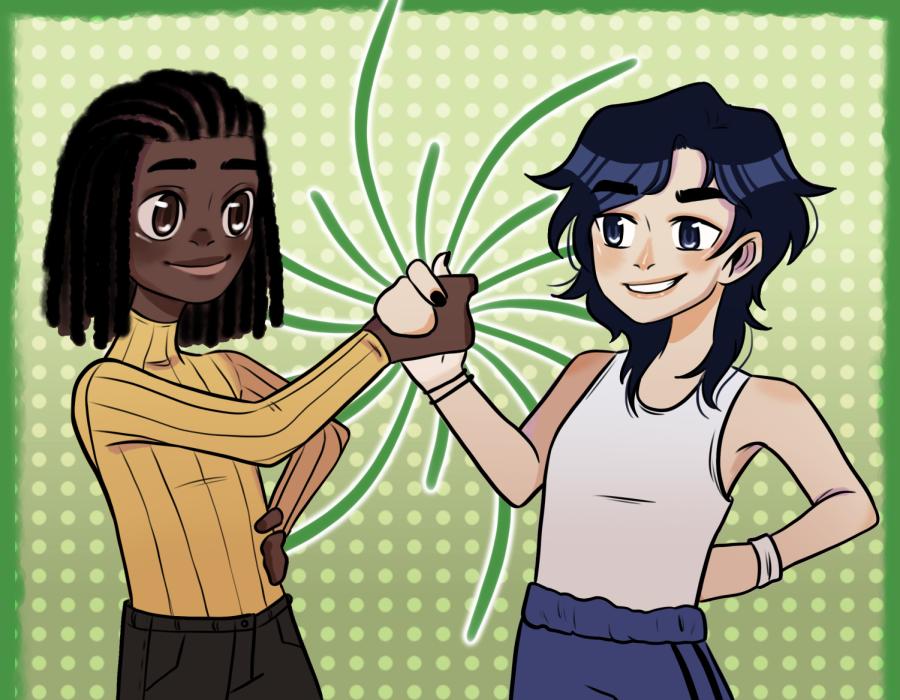GSC holds event for Black Asian solidarity, fosters intimate discussion on intersectionality
April 22, 2022
Editor’s Note: This article first appeared in the April 19, 2022 flipbook.
Students slowly trickled into the Multicultural Engagement Center ready to listen to the four panelists seated before them and learn from minority experiences outside their own identities.
The Gender and Sexuality Center’s Lotus Project held a Black and Asian Solidarity Event at the William C. Powers Center on April 14 from 6-7:30 p.m. The discussion consisted of four panelists of both Black and Asian descent: Priscilla Hale, Anî La’arni Ayuma, Michael Cordova and Seina Sleep. During the event, the panelists discussed what solidarity between Black and Asian communities looks like, confronting anti-blackness and xenophobia, and how people can make solidarity part of their daily practices.
“We are fed this idea of competition between marginalized communities as if there’s one seat at the table,” said GSC Program Coordinator Lilli Hime. “Knowing our histories and reaffirming our solidarity refutes that competition and chooses community.”
UT alum Seina Sleep, who is Black and Japanese, emphasized how solidarity is an everyday practice and members of these communities must actively foster these relationships.
“As far as people across different marginalized identities, it’s about getting to know each other, listening and being there for each other,” Sleep said.
Priscilla A. Hale, a Black community organizer and executive director of Allgo, an organization for queer people of color, focused on the importance of relationships between members of the communities and how those relationships lead to solidarity.
“Solidarity feels like a very academic word that can separate folks who don’t necessarily move through language like that, but all of us completely get relationships,” Hale said. “When you’re trying to work together, people decide what is the relationship and how much they value that. If there is none, then you’re less likely to be engaged and invested.”
For the event, GSC partnered with the Black Queer and Trans Collective, the Center for Asian American Studies and the John L. Warfield Center for African and African American Studies. Panelists reflected on their intersectional experiences being Asian or Black while also being part of the LGBTQIA+ community. Parker Kirlew, psychology and women’s and gender studies sophomore and BQTC president, said it’s important to talk about the complex relationships between minority groups.
“It’s really hard to think about how my community, as an already oppressed and marginalized community, (can) say something mean to another marginalized and oppressed community,” Kirlew said. “(But) it’s important that we have these conversations.”
Maddie Phung, a biomedical engineering sophomore and Vietnamese American student attendee, said she went to the event to educate herself on these topics and found value in the panel format.
“It’s interesting, especially having the group be from such a wide background, both (in) age and cultural background,” Phung said. “Having it be an actual event that you go to puts an emphasis on the focus of it. I like being there, so I can both learn for myself and for other people to talk to them about it too.”
FIlipino American panelist Ayuma said she hopes students will continue this conversation and work on themselves outside of these safe, controlled spaces.
“We’re learning about what to do,” Ayuma said. “It’s decentering our stories at the same time, even if we’re healing our narratives here within us.”
Hime emphasized engaging in conversations about the joint effort to alleviate minority struggles and build upon the long tradition of solidarity between Black and Asian communities.
“Solidarity events like this help us see how these issues are often overlapping and intertwined, affecting multiple different communities,” Hime said. “Our struggles aren’t on opposite ends of the world; they’re incredibly intertwined, … so the strategy to unravel these issues must be a joint effort.”












